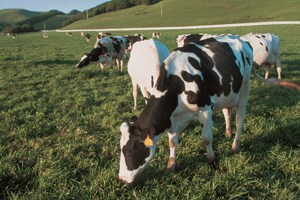As If GE Alfalfa Wasn’t Controversial Enough the First Time…
As the “superweed” problem worsens, the USDA must seriously consider the environmental, health and economic ramifications of this new GE alfalfa, and the agency’s overall system of blanket approvals on herbicide-tolerant GE-crops.
 By Genna Reed
By Genna Reed
Early this week, USDA announced the availability of a petition for a new GE alfalfa, marking the 20th GE crop currently awaiting USDA’s approval and eventual commercialization. Since the introduction of GE crops, the USDA has never denied a single petition for commercialization.
Touted as “low-lignin” to make it easier for livestock to digest, Monsanto and Forage Genetics’ new alfalfa variety will likely be stacked with Monsanto’s Roundup Ready trait (already approved for alfalfa in 2011). Throughout the petition, the companies cite the fact that “extensive review” has already been performed on GE alfalfa with the 2010 Environmental Impact Statement for Roundup Ready alfalfa.
Back then, the Environmental Impact Statement pointed to some negative economic impacts for organic and conventional alfalfa farmers, including increased costs needed to prevent contamination, reduced demand and lost markets due to contamination—which didn’t stop USDA from approving the crop. Those contamination costs are even more pronounced now. Alfalfa is an open-pollinated crop, meaning it is much more likely than corn or soybeans to contaminate nearby non-GE fields with the help of wind or insects. This crop poses special risks for organic alfalfa and for organic dairy farms whose crops may be contaminated.
Additionally, the review was performed three years ago and a lot has changed since then.
Since 2010, the number of Roundup-resistant weeds has grown from 11 to 14 and the amount of land infested with these weeds has grown from a reported 2 million acres in 2010 to industry estimates of more than 60 million acres in 2012. These numbers should raise a red flag, but Monsanto continues to petition for the introduction of more and more glyphosate-tolerant crops.
Herbicide use has escalated since the introduction of GE crops, and will only continue to grow as more of these GE crops are introduced. As the “superweed” problem worsens, the USDA must seriously consider the environmental, health and economic ramifications of this new GE alfalfa, and the agency’s overall system of blanket approvals on herbicide-tolerant GE-crops.
To weigh in on the rocket docket containing seven petitions for approval of new, herbicide-tolerant crops, sign this petition.


